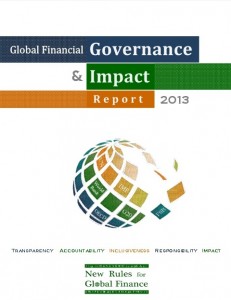October 31st, 2014
As the deadline for the Millennium Development Goals looms, policy makers worldwide have begun discussing a post-2015 development process to formalize new Sustainable Development Goals (SDGs). While targets have been discussed, creating a comprehensive financing framework remains essential to the process.
Continue Reading
June 25th, 2014

The IMF has a major new Policy Paper out entitled
Spillovers in International Taxation, looking at the effects that one country’s tax rules and practices can have on others.
Of course the IMF would never be so rude to some of its most powerful member states as to explicitly
say what is in our headline – but that’s what we read between the lines. “Spillovers” in international tax are all about tax haven activity, particularly when those spillovers are deliberately crafted.
Now that we’ve read it, we conclude that this is a really important document. It tears...
March 28th, 2014
 This post originally appeared on the blog of FTC member, Tax Justice Network.
This post originally appeared on the blog of FTC member, Tax Justice Network.
Last year, our colleagues at New Rules for Global Finance published a ground-breaking report on the governance and accountability of the leading financial rule-setting institutions, including those covering international tax cooperation, such as the G20, the OECD, the UN Tax Committee, and the IMF. Their report is available
here.
December 5th, 2012
LONDON – Bloomberg and Reuters news agencies have reported that the International Monetary Fund has halted its loan programme with the Democratic Republic of Congo because of concerns over transparency in the country's mining sector. While Congo is clearly in desperate need of funds, Global Witness believes that concerns over possible corruption in the country's mining sector were so serious that the IMF was justified in stopping its lending.
Continue Reading
 The IMF has a major new Policy Paper out entitled
The IMF has a major new Policy Paper out entitled 